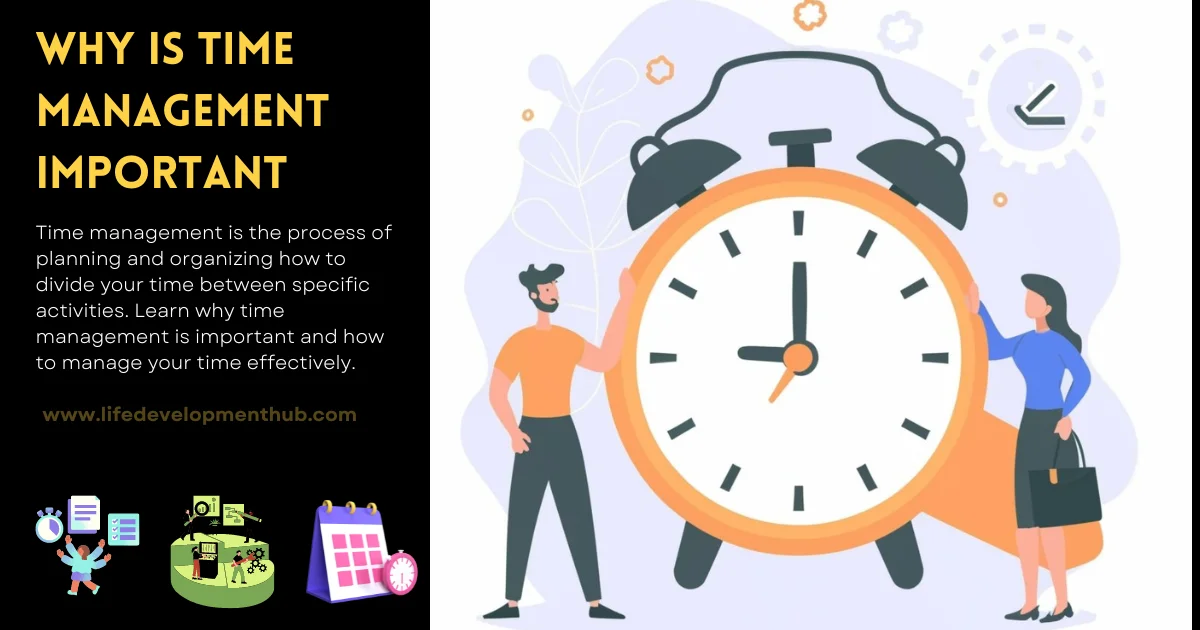Time management is the process of planning and organizing how to divide your time between specific activities. Learn why time management is important and how to manage your time effectively.
Time management is the practice of organizing and planning how you will divide up your time between different tasks, in order to work more productively and efficiently and complete them quicker. But why is time management so essential? Here are some benefits of effective time management:
Setting deadlines, prioritizing work and eliminating distractions will increase both performance and productivity. Focusing on quality results could produce superior outcomes as well.
Effective time management encourages invention and creativity within you. By setting aside enough time in your schedule for learning, experimenting and brainstorming sessions, effective time management enables you to be more inventive while solving issues more skillfully and seizing opportunities more successfully.
Enhancing self-esteem and confidence by accomplishing goals and meeting deadlines. You also earn respect from others which inspires further improvements.
Time management reduces tension and nervousness

Feeling overwhelmed and impatient due to too much to do and too little time may negatively affect relationships, bodily, and mental wellbeing. By practicing good time management skills you may lower workload, avoid procrastination, and enhance ability to deal with pressure more effectively.
Effective time management skills improve work-life balance. With these abilities in place, you can set aside enough time for both personal and professional activities without feeling guilty about missing out. They allow greater enjoyment from interests, pastimes and hobbies without guilt-induced regret
How Can You Utilize Your Time Effectively?
Now that you recognize the significance of time management, how can you hone your time-keeping skills? Below is advice that will assist with better time-keeping:
Set reasonable goals. SMART (Time-Bound, Specific, Measurable, Achievable and Relevant) objectives provide clarity as to your plans, how progress will be measured and when your duties will be completed.
Write Down Your Tasks. A to-do list can be an efficient and straightforward method for keeping track of all the things you have to do, while tracking progress. Creating one using calendar, computer tool or paper gives you flexibility when prioritizing jobs based on relevance or urgency.
Use a timer. Setting a timer can help you avoid distractions and manage your time more effectively by setting an alarm for 25 minutes at a time followed by five-minute breaks; after four cycles like this you can take an extended pause of 15-30 minutes.
Outsource and delegate.
You don’t have to do everything yourself. Some tasks that are repetitive or low priority could be assigned or outsourced; doing this allows you to focus on your primary responsibilities while conserving energy and saving time.
Evaluate and Reflect.
As part of a regular review and reflection routine, you should regularly evaluate how effectively you managed your time at the end of each day, week, or month. Ask yourself questions like: What have I accomplished, discovered or encountered as obstacles along my journey and what improvements can I make through review. By reflecting and reviewing you can identify strengths and shortcomings and implement necessary improvements.
Keep a calendar handy.
A calendar can help you to stay on top of appointments, meetings, deadlines and events – paper or digital calendars work equally well to plan out your day, week, month or year ahead – plus sync them with emails/phone calls/other devices for reminders/notifications so you don’t miss important dates/wasted time! A calendar also prevents double booking and helps ensure timely responses if there are unexpected appointments/meetings/duties!
Eliminate Distractions.
Distractions can interfere with your focus, reduce productivity and waste your time – such as phone calls, emails, social media posts, noise or clutter. To stop these interruptions from interfering with your day-to-day tasks and life goals, eliminate them. Try turning off or placing your phone on silent mode; closing email accounts; logging off social media accounts; wearing headphones/earplugs for improved listening experiences or organising your workspace as ways of combatting distractions.
Be able to say no.
At times, it may be necessary for you to decline requests or invitations that do not align with your goals, priorities, or values. Learning to say no can help prevent taking on too much, overcommitting yourself, or pleasing others at the cost of your time and wellbeing. Saying no may be difficult but can be done politely and respectfully by offering alternatives or suggesting compromise solutions.
Q&A
Q: What are some common time management challenges?
A: Common time management issues include unclear objectives, inadequate preparation, procrastination, interruptions, multitasking, perfectionism and burnout.
Q: Which apps or programs can help with time management?
A: Some time management tools and applications to consider are Forest, RescueTime, Todoist, Evernote, Trello, Google Calendar and Focus Booster.
Question: How can I improve my time management abilities?
A: Utilizing a to-do list, setting a timer, assigning tasks to others, outsourcing and delegating work, reviewing past performance and picking up tips from others are all excellent ways of improving time management skills.
conclusion
Effective time management can help you accomplish more with less time, improve work-life balance, build confidence and self-esteem, foster creativity and innovation, reduce stress and anxiety levels and ultimately increase productivity, efficiency, success in both personal and professional endeavors.
A few pieces of advice may assist with successful time management – creating a to-do list, setting SMART objectives, using a timer, outsourcing tasks as needed to others, evaluating them later and reflecting.
By honing these skills further you may increase productivity efficiency success across both aspects of life!

